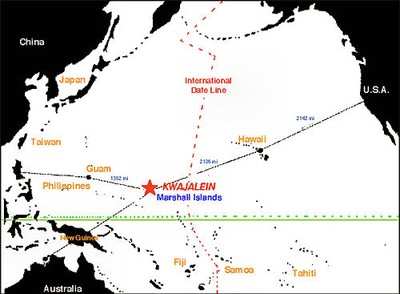Army Missile-Defense Activity Causes Schedule Change
Thanksgiving afternoon,
Aero-News received a heads-up that the Falcon 1 launch was going to
be "scrubbed," not due to any problems with Falcon 1, but due to
"something happening on the range." That was quickly followed by a
clarification -- the mission was not being scrubbed per se, it was
merely being slid 24 hours. We checked with our military sources
and they concurred, saying that the delay was not caused by
SpaceX.
Indeed, while a question to SpaceX went unanswered directly,
company founder Elon Musk sent the following to the press in
general.
Falcon 1 Launch Delayed by Army Range
In order to facilitate preparations for a missile defense
launch, the Army Space and Missile Defense Command (SMDC) has
bumped the SpaceX Falcon 1 maiden flight from its officially
scheduled launch date of 1 p.m. California time (9 p.m. GMT)
on November 25. The new launch time is 1 p.m. California time
(9 p.m. GMT) on November 26.
---Elon---
Aero-News will continue to bring you the latest on the Falcon 1
launch, both from SpaceX's sources and from our own.
Why was the delay necessary? SpaceX plans to launch their
missile from The military conducts launch activities from a tiny
island in the Kwajalein Atoll, Omelek. The very next island, Meck,
is a center of military activity. The military tests the
ground-based mid-course interceptor there.
It seems likely that the military could not secure everything on
Meck Island in time for the SpaceX launch, and so they want one
more day. The military plans to reduce manning on Meck as a safety
precaution during the SpaceX launch from nearby Omelek.
How nearby? The launch photo shows a Mid-Course Interceptor
launch from Meck island (on the right) and you can see the tip of
Omelek on the left. (Compare this photo to the 1939 map of
Kwajalein).
This ballistic missile defense organization program has been
cursed with bad luck -- all the very hard things, like hitting a
rocket with a rocket from a standing start, have been going well,
and all the relatively easy things, like getting a gantry arm to
drop free in a launch sequence, have caused highly embarrassing
aborts. As the military has already deployed some of the missiles
to defend against a possible ballistic missile attack from a rogue
state, it has a lot invested in missiles that work.
"This next test is make-or-break for us," an insider tells
us.
Similarly, the Falcon 1 launch is a make-or-break deal for
SpaceX. Elon Musk, the visionary who made a fortune founding
PayPal, has a lot riding on the orbital booster. SpaceX points out
the significance of this booster goes far beyond their company, in
turn.
Falcon 1 will be the first privately developed, liquid fueled
rocket to reach orbit. It's the world's first all-new orbital
rocket in over a decade; its Merlin main engine is the first
all-new American hydrocarbon booster engine to fly in forty years.
It's the first booster, apart from the Space Shuttle space
transportation system, to be even partially reusable, and it
provides the lowest cost to flight of any launch vehicle in the
world -- American, Russian, European, Brazilian, Chinese -- at $6.7
million.

The design is rated by engineers as highly reliable, equal in
reliability to the most reliable American boosters. But that's
still far short of 100%, and nobody would be surprised if Elon Musk
was slightly anxious.
 ANN's Daily Aero-Term (12.08.25): Decision Altitude (DA)
ANN's Daily Aero-Term (12.08.25): Decision Altitude (DA) ANN's Daily Aero-Linx (12.08.25)
ANN's Daily Aero-Linx (12.08.25) NTSB Final Report: Piper PA-31T3
NTSB Final Report: Piper PA-31T3 Aero-News: Quote of the Day (12.08.25)
Aero-News: Quote of the Day (12.08.25) Airborne-Flight Training 12.04.25: Ldg Fee Danger, Av Mental Health, PC-7 MKX
Airborne-Flight Training 12.04.25: Ldg Fee Danger, Av Mental Health, PC-7 MKX



